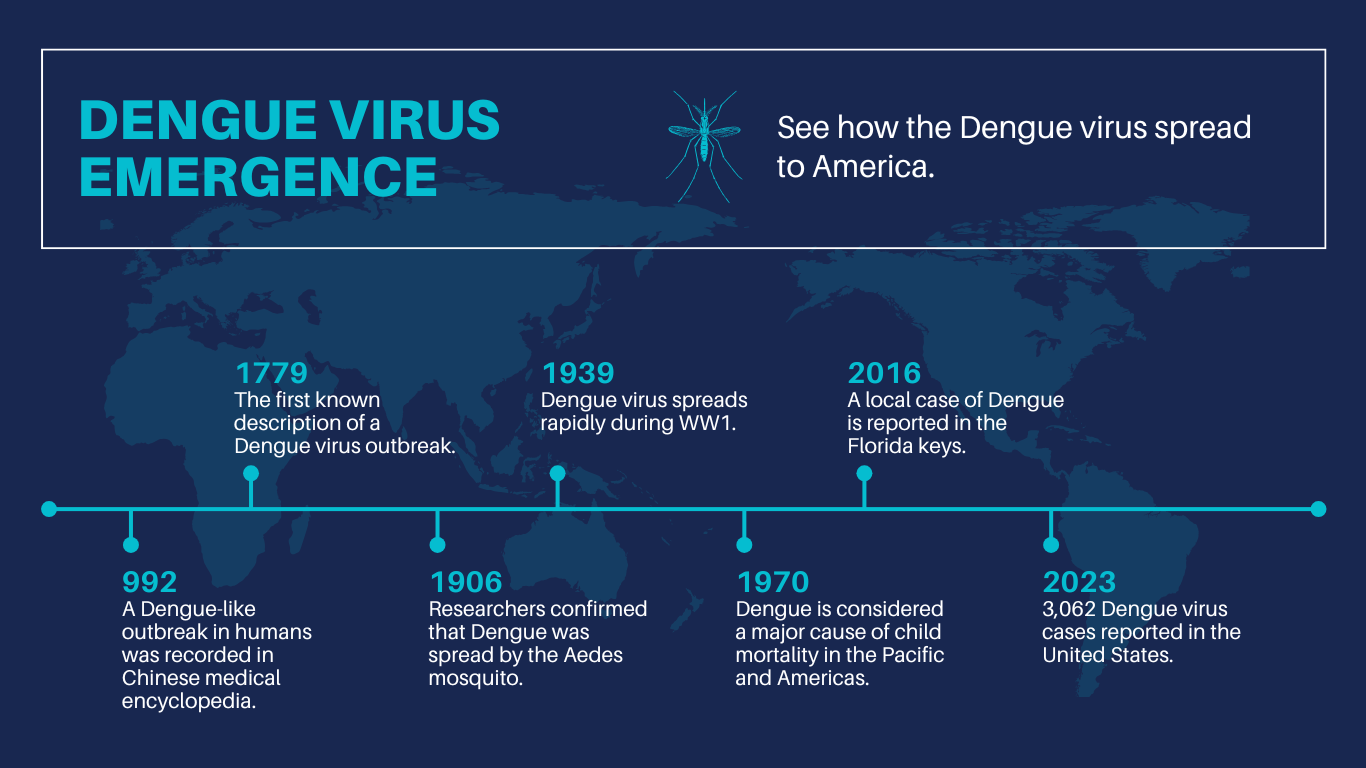Dengue Fever: What You Need to Know
Dengue virus emerged as a global problem in the 1950s. Endemic in Puerto Rico, Latin America, and the Pacific Islands, Dengue occurs less frequently in the continental United States. However, with increased public awareness about mosquito-borne diseases, such as Zika and West Nile viruses, the growing threat of Dengue in the United States is also becoming a notable concern.
As of July, 2024, the CDC reports that there have been more than 2,391 cases of dengue recorded in the United States. Florida led the nation with the most locally-acquired and travel-associated cases in the United States. These outbreaks underscore the potential public threat of the disease and why effective mosquito control is critical to any effort made to reduce the spread of Dengue.

Dengue is transmitted through the bite of an infected mosquito. The most common vector of Dengue is Aedes aegypti, a species that is prevalent in the southernmost American states, with established populations in Texas, Florida, Hawaii, and elsewhere. According to the CDC, the most common symptoms of Dengue fever include high fever, severe headache, severe pain behind the eyes, joint pain, muscle and bone pain, rash, and mild bleeding. There is currently no known cure for Dengue, so controlling the mosquitoes that carry Dengue is essential to fighting the disease.
For residents in areas populated by the Aedes aegypti species, the most important preventative measure they can take is to remove artificial containers and to modify water holding features wherever possible to eliminate breeding sites. This species can breed in as little as one tablespoon of water, so every effort should be made to eliminate standing water in all artificial containers such as buckets, old tires, gutters, birdbaths, flower pots and more. Additionally, residents should protect themselves indoors with the use of air conditioning and properly maintained window screens, and outdoors with the use of mosquito repellents containing EPA approved active ingredients and loose-fitting clothing. More mosquito prevention tips for homeowners can be found at mosquito-awareness.com.

For mosquito control professionals to maximize the effectiveness of their efforts, a comprehensive Integrated Mosquito Management program should be implemented. The multi-phased approach includes larval and adult mosquito surveillance to monitor populations, disease monitoring, source reduction to reduce standing water where possible, biological control incorporating native or introduced mosquito predators, the application of larvicides and adulticides when appropriate, and public awareness campaigns.
While the ideal mix of products and application methods will vary by region and species of mosquito, most programs rely on a combination of adulticides and larvicides to provide the most effective level of control. Adulticides kill the fully developed adult mosquitoes that can spread diseases and they offer the quickest means of reducing active, biting mosquito populations. Zenivex ® adulticides feature Etofenprox, an active ingredient that is highly effective, requires no synergist, and is classified as reduced risk by the EPA, making it an excellent choice for both rural and urban environments.
While Zenivex® adulticide products provide quick knockdown and control of adult mosquito populations, the use of larvicides is essential to controlling potential mosquito outbreaks in the long-term. Altosid® larvicides are available in multiple formulations featuring (S)-methoprene, an insect growth regulator (IGR) that stops mosquitoes from becoming breeding, biting adults without impacting non-target organisms. FourStar® microbial larvicides are a great complement to Altosid® products, offering control of mosquito larvae using naturally occurring bacteria (Bti & Bsph) and “dual action” release technology. Finally, Duplex®-G larvicide offers the best or both worlds, combining the residual control of (S)-methoprene with the quick knockdown of Bti microbials in one effective granular formulation.
Dengue, and other mosquito-borne diseases, can be a threat to public health, but one that can be minimized through effective vector control efforts. To learn more about mosquito control, find your local sales representative.






